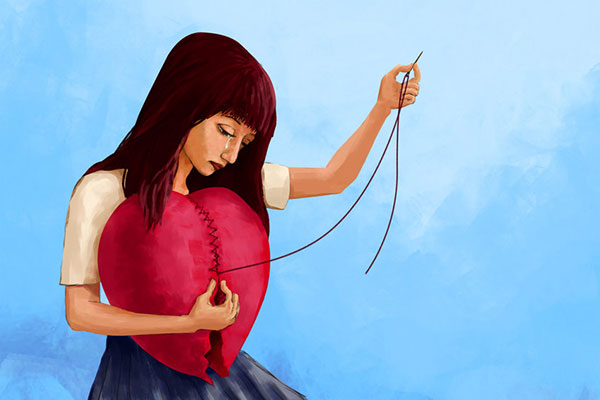self-worth
Let Your Authentic Self Shine
 Most people at some point change something about ourselves in the hope of being better liked or accepted by others. Whether it’s a group of friends, a potential romantic partner, or the manager at work, there is constant pressure to conform and fit in. But in the long run, does this help? The truth is: it really doesn’t.
Most people at some point change something about ourselves in the hope of being better liked or accepted by others. Whether it’s a group of friends, a potential romantic partner, or the manager at work, there is constant pressure to conform and fit in. But in the long run, does this help? The truth is: it really doesn’t.
The notion of simply being your authentic self is challenging in an era where everyone seems to be seeking approval and attention. Therefore, the authentic self or the true version of our soul is something one hardly sees in the digital era of social media, influencers, likes, and followers.
However, we may think that a person we see online is someone others won’t like. Maybe our internal critic sees that person as ‘too much’ of something or ‘not enough’ of another. But we are often mistaken, as someone being true to themselves and keeping it real is what most people are spontaneously drawn to.
You might feel like you’re the only strange person at work, or the black sheep of your family, but you’re not the only one. There are thousands of ‘odd’ people out there right now with the same doubts as you!
The old saying ‘there’s a lid for every pot’ is always good to keep in mind. Your authentic self is just what someone else has been looking for. If you feel you don’t fit in with the crowd, take a step back and ask yourself whether you truly want to be part of it anyway? Knowing your true value and finding the things most important to you, will help determine who you want to surround yourself with.
It’s also important to set healthy boundaries. If you feel peer pressured into joining a group, or liking something simply to fit in, ask yourself if this is true to your core. Does it resonate with your authentic self?
Learning To Truly Be With Yourself
 A fellow psychic encouraged me many years ago in a reading to be ‘with myself’ and not just ‘by myself.’ There was a difference she explained, as this was a process of getting to know our own true essence. But being yourself can be an uncomfortable pathway for introspection! It is a lot easier to distract yourself with work, entertainment, chores, socializing and all the other ways we tend to divert our attention away from looking within.
A fellow psychic encouraged me many years ago in a reading to be ‘with myself’ and not just ‘by myself.’ There was a difference she explained, as this was a process of getting to know our own true essence. But being yourself can be an uncomfortable pathway for introspection! It is a lot easier to distract yourself with work, entertainment, chores, socializing and all the other ways we tend to divert our attention away from looking within.
A wise client told me recently that it was during the recent pandemic lockdowns that her journey towards true self-love really began. My clients are often my most important teachers, as they prompt me at times to look deeper into a situation.
She had been going through intense periods of intense reminiscing, especially regarding relationships. Most of her flashbacks related to two significant past relationships which, after investing so much of herself, had not worked out.
One of her partners just didn’t want to commit and was wrapped up in a materialistic obsession of striving to achieve business success. The other, whom she loved very much, left her for another woman.
Ironically, after years of loneliness and looking for ways to fill that void, this ex she whom she used to love so much, recently got back in touch with her. Apparently, he wants to be a part of her life again, once he´s finally sorted out his disastrous relationship with the woman he left her for.
But she now feels she has healed, forgiven him, and truly fallen in love with her own company, and therefore she wouldn’t want him in her space too much, and that any future moments they do spend together will be on her terms.
She has nailed it when it comes to truly being ‘with yourself,’ instead of lonely ´by yourself.’
How To Heal Your Broken Heart
 In the 1960’s Roy Orbison belted out the song, It’s Over. Even at four years of age, it stirred my emotions hearing it on the radio. In 1984, I heard the exact same words from a man I very much loved and believed to be ‘the one.’ Thankfully, he was not, but that is another story.
In the 1960’s Roy Orbison belted out the song, It’s Over. Even at four years of age, it stirred my emotions hearing it on the radio. In 1984, I heard the exact same words from a man I very much loved and believed to be ‘the one.’ Thankfully, he was not, but that is another story.
He turned to me and said, “We’re not a good match.”
I remember that moment as if it were yesterday. My heart jumped and my knees turned to jelly. I felt so lost and alone, as well as almost every other negative emotion possible…from anger and hurt, to frustration and hopelessness. All these emotions coursed through my body like a freight train.
How was I going to cope without him in my life? What will become of me? What do I do now that it is over?
At 24 years of age, I did not have much experience dealing with loss, disappointment, and grief as I do today. Today, as a practicing psychic with many years of professional experience, I would offer my younger self the following spiritual advice regarding healing a broken heart.
Acknowledge
I believe we can also mourn the living, just as much as we grieve for someone who has passed away. Indeed, acknowledging finality, in whatever form the finality presents itself, can be a challenging thing to do, especially if you are emotionally involved with someone. That said, it is much better than holding onto false hope, which is far worse. Continue reading
The Healing Power Of Positive Self-Talk
 Most people indulge more in negative self-talk, than positive. But self-talk is not supposed to be negative and overly critical. We are supposed to use it to encourage, empower and motivate ourselves to achieve success and follow our dreams.
Most people indulge more in negative self-talk, than positive. But self-talk is not supposed to be negative and overly critical. We are supposed to use it to encourage, empower and motivate ourselves to achieve success and follow our dreams.
Our brain has the conscious mind, the subconscious mind, and what is known in hypnosis as the critical factor of mind. This critical factor is that part of our consciousness that checks and filters every through and idea that enters our mind. It is like the gatekeeper or the guardian between the conscious mind and the subconscious. That is how hypnosis works – it is a way to bypass the critical factor so that we can access the subconscious and reprogram it with new information and insights for healing and self-empowerment.
The role of the critical factor is to protect our mind, but this is not always a good thing. Because of the job the critical mind is tasked to do, it tends to be critical of everything. It is unfortunately also that part of our brain that says we are not worthy or deserving, that we cannot do things, or achieve things.
I cannot get the job I really want.
I’m not worthy of a happy, healthy relationship.
I am not smart and pretty enough.
People just don’t like me.
Why do bad things always happen to me?
The one big problem with the critical factor is that it does not always see or hear things the way they really are. It can convince of things that are not true at all. For example, it may you that others are trying to get you fired from a job, when in fact the boss is trying to help you keep your job.
The Spiritual Aspect Of Physical Ailments
 As a medical Reiki master and teacher, I have come to understand that there is often a spiritual aspect to almost every illness, pain or symptom that comes up in the physical body. When we are not in alignment with our spiritual self, it can create imbalances in many aspects of our health and wellness.
As a medical Reiki master and teacher, I have come to understand that there is often a spiritual aspect to almost every illness, pain or symptom that comes up in the physical body. When we are not in alignment with our spiritual self, it can create imbalances in many aspects of our health and wellness.
Note that I always recommend seeking and following professional medical advice. Despite the possible underlying metaphysical and spiritual aspects of any illness or disease, you must never assume that the intervention of a registered medical practitioner is not needed. Always seek medical advice if you are not feeling well, and do not stop using whatever medication and treatments have been prescribed for you without consulting your doctor. It could save your life.
What I can however recommend is to supplement your conventional medical treatment with energy work and other spiritual healing practices. The Eastern practice of Reiki is something you can use effectively to compliment your western medicine treatment.
Reiki is an energy healing modality that brings our chi into alignment. Chi is the energy of life itself. It is an electromagnetic energy which flows through everything in creation. Reiki brings the chi of the body, mind, and spirit back into alignment and can reveal which areas need to be worked on, or released, or simply acknowledged.
Here are a few examples of common spiritual meanings behind some of our ailments. Headaches are often associated with self-criticism and fear. They are also a source of feeling invalidated in some way and often aimed at the self. The solution is to start affirming how amazing you are, how divinely perfect you are, how much you love yourself. The best affirmation you can say is:
I love myself unconditionally. I am perfectly perfect as I am.
Technology Does Not Make Love Any Easier
 I have personally found over many years of falling in love myself and having been in both good and bad relationships, as well as doing love and relationship readings for thousands of clients all over the world, that romantic love is more about personal soul growth, spiritual evolution and enlightenment than anything else. I find that only once we have learned certain life lessons and spiritual insights, especially with regards self-love, are we truly ready and able to love others unconditionally. Only then you can truly love someone one else, and have them love you equally in return. When this finally happens it is a lovely thing indeed, but in today’s world it is becoming be a rare thing.
I have personally found over many years of falling in love myself and having been in both good and bad relationships, as well as doing love and relationship readings for thousands of clients all over the world, that romantic love is more about personal soul growth, spiritual evolution and enlightenment than anything else. I find that only once we have learned certain life lessons and spiritual insights, especially with regards self-love, are we truly ready and able to love others unconditionally. Only then you can truly love someone one else, and have them love you equally in return. When this finally happens it is a lovely thing indeed, but in today’s world it is becoming be a rare thing.
Having a tight-knit, loving family or a lasting romantic relationship has become almost ‘abnormal’ in our modern world. In my view technology has been hindering us more than it is helping. The many social media platforms and dating apps we use these days has made love and romance even more complicated. These social networking sites have also created many new problems in long-term relationships and marriages, and I have witnessed it destroying many good relationships.
For example, too many of folks are curious about their ex-partners, because they now have more access to ‘stalking’ others. Some even want to reunite with their ex, who has married someone else in the meantime. Social media offers them an easy way to renew contact and often leads to trouble. Don’t get me wrong, technology is a great thing if used properly, but sometimes it can be also be too convenient and intrusive in other people’s lives.
